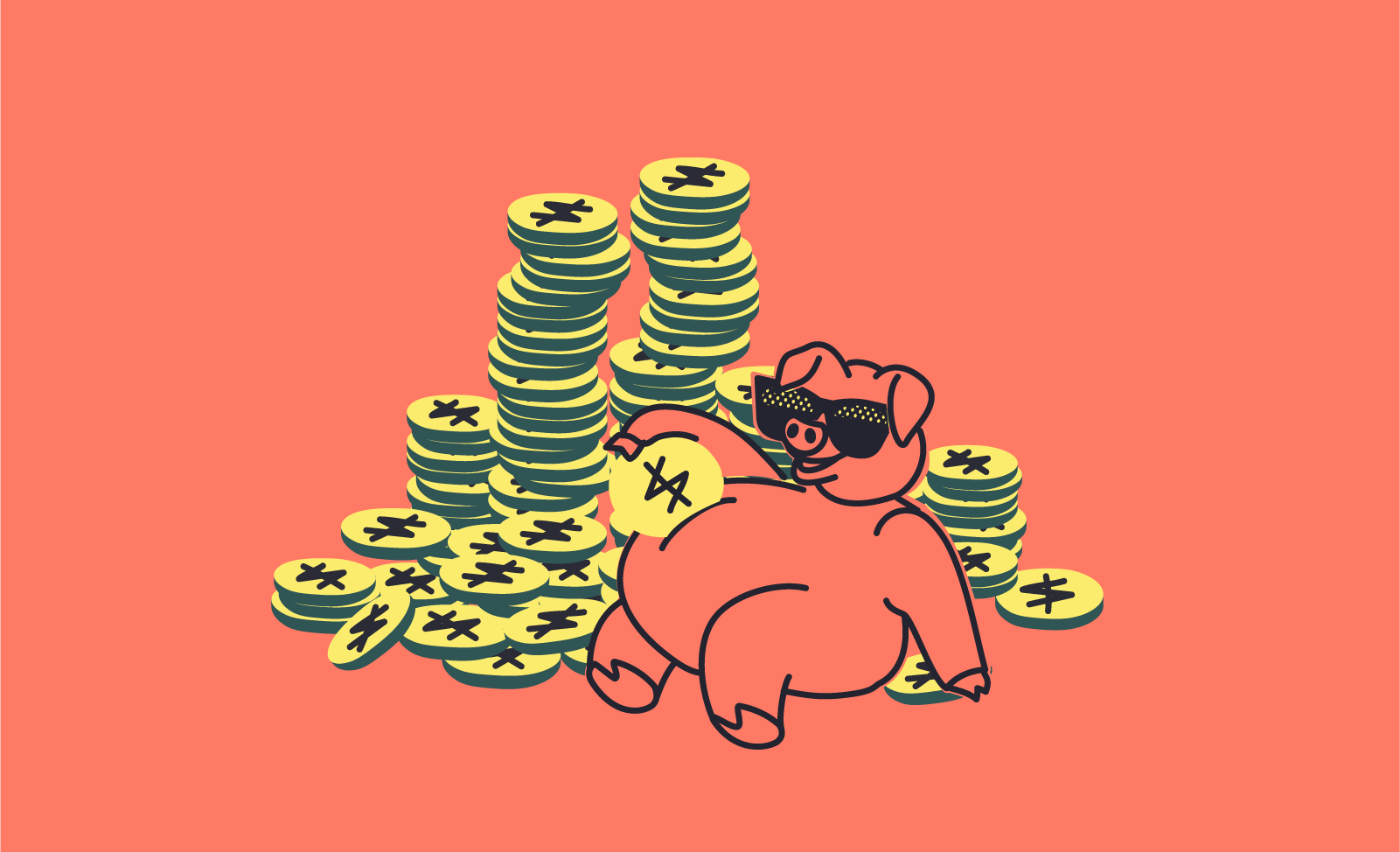How to Save for a Baby

Babies are great. When they’re small, you can pop them in a tiny backpack and carry them around with you, and when they’re older they can get you a sandwich while you stay in bed.
Heaps of the Up team are having babies right now — seriously, we could start a dodgeball team as soon as they all start walking — and since mine are six and four right now, I'm taking a moment to share my best baby-having savings tips with them, and with you.
We talk a lot about saving here at Up. I reckon saving for a baby deserves its own blog post, cause it feels different to other kinds of saving. There's a tight timeline, and it's full of unknowns that can keep you up at night. I definitely had low key panic attacks early on, reading about what childcare might cost.
Baby stuff might feel pretty intimidating – but if you don't have extra thousands sitting around in your Savers (I definitely didn't!), that is perfectly OK. You're still going to be able to give your little person everything they need.
But babies will cost money in some ways, and a little planning can really pay off, especially for your mental health and for buying time off work to get to know your new smol bestie.
No one ever plans perfectly for a baby. Sometimes we don’t even get the option to try. So, let’s ditch extremely unhelpful ideas about perfection, and take a look at savings strategies that are in your control. Whether you’re just thinking about it or a little human is already in countdown mode, you can take steps to save.
In this blog post:
- Decide on what you'll actually need
- Getting set up
- Ongoing costs: what’s critical and what’s just not
- Walking your own path as a parent (and with $)
- Asking for help ( because people want to help)
- What really matters when you're saving for a new baby (hint: it's not a $5000 pram)
Decide on what you’ll actually need
OK. There are some core financial responsibilities that come with most babies. They mostly fall into two categories: getting set up and ongoing costs. I'll break each down below so you can decide what price point you want to be at, knowing you don’t have to splurge on everything. A baby doesn’t know if it’s sleeping in a designer Scandi crib or a bassinette on loan from friends. Your best is exactly right.
Of course you'll change your mind a bit as you go, but putting together a rough budget for what you plan to spend at the beginning and ongoing, will help you decide how much to put aside.
PRO TIP: Setting up or boosting Round Ups on that special Saver now, could help you out of an unexpected cost or two when baby arrives.
Getting set up
How much will you need at the beginning of baby's life? Well, there will be some non-negotiables. Baby needs a place to sleep, a way to get around, and weather-appropriate clothes.
Sleeping configurations are a personal choice. Do some research into benefits and risks associated with the different options. You may not need a full-sized crib until later, so you can start with simple and find the next thing once your bubba has let you know what they need. Also, babies outgrow their beds really fast, so there are often second-hand ones floating around.
If you drive, you'll need a safe car seat that’s properly installed. If possible, get a brand-new one – you just don’t know if second-hand seats have been involved in accidents that might make them unsafe. A pram or carrier will make it easier to get to the shops.
Babies basically live in their PJs and they go through approximately three million changes a day. You'll want bulk socks, jumpsuits, singlets, hats or beanies, and leggings. For sure, have some cute stuff, but the second change at 2am just needs to be on.
If you’re breastfeeding, you'll want breast pads and a bra that’s easy to unclip. If you’re formula feeding, you’ll need some bottles, teats and a way to clean them. Burp cloths and wraps will help with mess, but old t-shirts also do a perfect job.
It can help to get ahead on some items. When your budget allows, think about building a stockpile of nappies (in the larger sizes, cause some babies come out bigger than others and they all grow fast). They regularly go on half price at the supermarket, so you can save by keeping your eyes peeled. Pick up a nappy cream. Skip the change table – you’re just as likely to change your baby on a towel on your bed.
Optional: a miniature bath, squeaky toys, picture books, a breast pump, a nappy bag that unfolds into a change mat, professional newborn photos.
Skip it: automated bottle sterilisers, self-propelling swings, jeans, miniature cutlery, tiny Nikes. I swear to you they will just kick off the Nikes.

With Maybuy, you can track and save for things you'll need, but only buy them when you’re totally ready. So if you find the perfect PJ’s on Gumtree, you can roll those savings back for something else.
Ongoing costs
OK, that's setup, but we're also looking to carve room in every pay for this new small person. That's more of an ongoing saving program.
In a lot of ways, the ongoing costs for babies are the same as for us, but littler: food, clothes, medicine and little treats that make life bearable. You may see an increase in your utility bills, especially if the weather is very hot or cold when baby arrives: you’ll be up and moving around in the middle of the night, and you’ll want everyone to be comfy.
Before baby arrives, check that you’re on the right plans and with the right providers. How much data are you actually using? Is there a bundle that will save you dosh? Would switching to another service provider be more cost effective in the long run? Are you paying account keeping fees for no reason? Insights might come in handy here to check your spending for things that could be reduced or nixed completely.
The other major ongoing cost for many families is childcare. There are different types and the cost varies accordingly. Visiting local centres is a good place to start, but it can also be helpful to ask friends, family and that cute family in the park for recommendations. I looked at some really cool play centres for my kids, but I'm pretty happy that I settled on a place that was low-key (and lower cost) but totally loving.
Childcare can come at a hefty cost, which is hard when you need it to get back to work. Check if you’re eligible for government assistance available through the Child Care Rebate and/or Child Care Subsidy, or speak to Services Australia directly to find out what support is available.
Walk your own path
Feels like advice and opinions on what you 'need' to buy are everywhere? Yep, and it's a real mixed bag. This is one of those times in your life when who you listen to is probably going to change forever anyway, so take a step back from the pretty Insta posts (hashtag #sponsored) and choose your mentors carefully. It can save you both stress and serious cash.
Talk to your doctor about how long you’ll probably be able to keep working, so you can figure out how much time out you'll need to cover. If you have a partner, strategise on sharing the time off. Ask about support options when you go to medical appointments: midwives and community nurses in particular absolutely love hooking you up with free stuff and services.
I found it was also really helpful for my mental health to find people who were parenting in similar circumstances as me. For a while it felt like everyone could (and wanted to) take extended time off work, use private health cover, rely on a phenomenal partner who has a great job, and buy pretty clothes on a whim. But everyone has challenges to figure out, and you can choose to connect with people who are walking the same path as you.
Ask and you shall save
When you let people know what you need, heaps of them are going to want to help. I found that a lot of the help I got was completely unexpected. Colleagues came out of nowhere with massive bags of clothes, and that angel at the coffee shop who held the kid mid-puke will be my forever bestie. The single mates who rocked up to visit with fresh coffee and a bag of fruit will have my love until I die.
Ask people what baby items they couldn’t have lived without, and then ask if they still have them. Now that I'm done with having littlies, I'm super grateful to get the storage space back, so think about it this way: you're also doing them a favour.
Local social media groups will often have bags of second-hand baby clothes and gear for sale or for free. Have a chat with the sellers: you can save serious dollars by making one mate whose kiddo is a bit bigger than yours, and one mate whose baby is littler. Friends will share those free vouchers from food delivery services. Kind neighbours will bring around the things you forgot at the supermarket.
Lean on what’s provided at childcare, free kids’ fruit at the supermarket, end-of-day specials, the weird-looking veggies people think taste worse (they don’t). If your kid gets fruit and veg at childcare and at Woolies, they will survive and thrive if dinner is very often pasta with Kraft parm at home. (Ask me how I know.)
Accept offers to babysit, clean the house or do a shop run. Use the coupon. Freeze the leftovers. Anything that is going to make your life easier to manage.
If you're lucky enough to be asked about a baby registry, write it with the knowledge that people love you. (Personally I'd just ask for wipes and nappies and never ever regret it. I still use baby wipes every day.)
Plan to be able to do less
You’re about to sleep less and be in high physical demand. If you're the one who's pregnant, that's started already.
It’s likely your plans will need a few contingencies. The best thing you can do is try to embrace it. It’s probably going to take longer to get ready to go out. Daytime activities may need to fit around naptimes. When you do have time for yourself, you might just want to close your eyes for a few days.
Recognising this can be helpful for budgeting. Working the same shifts as before may be too much, or you could need more time to recover than you expected. If you can, maybe work to a slightly lower weekly expenditure than you can afford, in case you need a bit more later. Splitting part of your pay into an emergency fund now could get you out of a jam later.
On the upside, you may well be doing less and going out less for the next eighteen years or so. If people want to see you, you can suggest they come over. With snacks. They’ll probably really appreciate you being clear about how they can help – and then you have snacks.
Don’t spend money on a solar-powered organic bottle warmer
Baby stuff is a lucrative industry. It’s easy to see why – it’s tiny, adorable, and the marketing makes it seem as though you’re neglecting your baby if you don’t buy it.
That’s simply not true.
Because my best baby saving PRO TIP is this.

Your baby needs four things: to be warm, fed, clean and loved. And if you're already reading this and thinking about how to save a bit now to make all of that easier later, I reckon that baby is going to be just fine.

Get the gist
We’ll swing our monthly newsletter and release notes your way.




